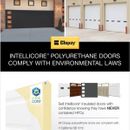Clopay garage door insulation is HFC free! Others?
It’s been hard to find out what blowing agents door manufacturers use in their polyurethane foams, but Clopay was finally forthcoming with a definite statement that they do not use HFC and are in compliance with California, NJ, Washingon and Candadian regulations on that.
They other known-low-GWP option is EPS, which is available in a lot of lower-end doors.
Has anyone else tried to get this information from other door manufacturers?
I first asked this here six years ago. I went with Jeld-Wen entry doors which have neopor (graphite enhanced EPS) insulation, but I still haven’t gotten to replacing my garage door. It looks like my options just expanded…
Edit: Here’s the text of what they say:
Clopay doors do not contain HFCs. All Clopay doors are compliant with:
-
California SB 1013
-
Washington HB 1112 – Hydrofluorocarbon Greenhouse Gas Emissions
-
Canadian regulations amending the ozone-depleting substances and halocarbon alternatives regulations
-
New Jersey A-5583/S-3919 – Greenhouse Gas Bill
GBA Detail Library
A collection of one thousand construction details organized by climate and house part










Replies
That is great to learn. Were you able to find out any info on how well they seal? Without a good seal, an insulated door is less useful.
Most of them say, "Product complies with 2015 IECC air infiltration requirement of 0.40 cfm/ft2 or less (IECC, Section C402.5.2)," but beyond that they actually have a page with details:
https://www.clopaydoor.com/commercial/architects-corner/iecc-compliant-clopay-commercial-garage-doors
Some are substantially lower infiltration. And they list the actual U-factor there too. Which is a lot more realistic than their R-value numbers which don't take into account the major thermal bridging.